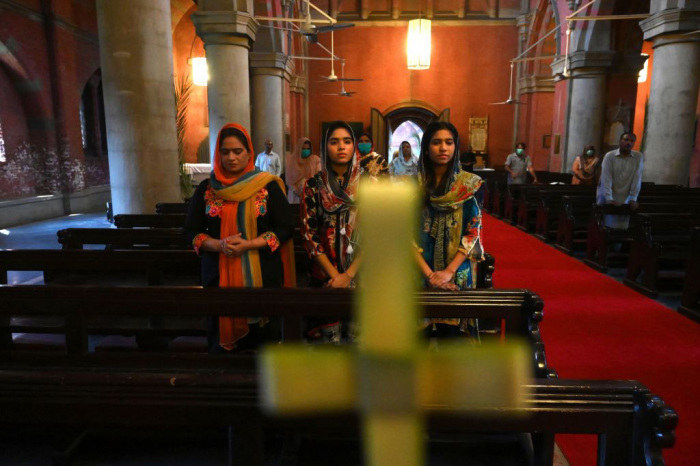Christian persecution on the rise in at least 18 countries: report

Persecution of Christians is on the rise in at least 18 countries, especially in Africa, the Middle East and Asia, due to growing jihadism and nationalism, according to a report released by a Catholic group that examined human rights violations against Christians in 24 countries where it is particularly difficult to be a Christian.
An analysis of the persecution of Christians in 2020-2022, compared with 2017-2019, shows that the situation for Christians has become worse, or “slightly worse,” in at least 18 countries, said the report released by Aid to the Church in Need.
These countries include Syria, Turkey, Saudi Arabia, Mali, Sudan, Nigeria, Eritrea, Ethiopia, Mozambique, Afghanistan, Pakistan, Myanmar, Russia, North Korea, China, Vietnam, India and Qatar, according to the report titled “Persecuted and Forgotten? A Report on Christians oppressed for their Faith 2020-22.”
Around the world, more than 360 million Christians live in places where they experience high levels of persecution just for following Jesus — that’s one in seven believers worldwide, according to Open Doors USA’s World Watch List, which ranks the top 50 countries where Christians experience the worst persecution for their faith.
The ACN said its report was presented in the Houses of Parliament in the U.K. this week with a keynote address by Nigeria’s Bishop Jude Arogundade, whose Diocese of Ondo was targeted by gunmen who killed more than 40 people at a packed Sunday service on Pentecost Sunday this year.
Bishop Arogundade said, “no one seems to pay attention to the genocide” taking place in swathes of Nigeria’s Middle Belt. “The world is silent as attacks on churches, their personnel and institutions have become routine. How many corpses are required to get the world’s attention?” he was quoted as saying.
African countries saw a sharp rise in terrorist violence from non-state militants, with more than 7,600 Nigerian Christians reportedly murdered between January 2021 and June of this year, the Catholic group said in the report, adding that in May, a video was released showing 20 Nigerian Christians being executed by Islamist terror group Boko Haram and Islamic State’s West Africa Province.
In Asia, “state-authoritarianism” was behind the worsening oppression, especially in North Korea, where religious beliefs and practices are routinely and systematically repressed, it said.
The report also noted that religious nationalism has triggered increasing violence against Christians in the region, with Hindu nationalist and Sinhalese Buddhist nationalist groups active in India and Sri Lanka, respectively.
The report noted that India witnessed 710 incidents of anti-Christian violence between January 2021 and the start of June, “driven in part by political extremism.” It cited an example of a mass rally in Chhattisgarh state last October, where members of the ruling Bharatiya Janata Party applauded as right-wing Hindu religious leader Swami Parmatmanand called for Christians to be killed.
In the Middle East, the report said, a migration crisis threatened the survival of some of the world’s oldest Christian communities.
In Syria, the Christian population declined from 10% to less than 2%, falling from 1.5 million just before the war began to around 300,000 today, ACN said, adding that while the rate of exodus is slower in Iraq, a community that numbered around 300,000 before the 2014 invasion by ISIS had halved to 150,000 by the spring of this year.
At this month’s G20 event centered on religions' role in helping solve global problems, the Most Rev. Bashar Warda, the Chaldean Catholic Archbishop of Erbil, warned that Christianity in Iraq was “on the very edge of extinction.”
During his remarks at the G20 Religion Forum in Bali, Indonesia, the archbishop stressed that “sectarian violence” was a significant problem in Iraq. This country suffered the rise of an Islamic State stronghold during the last decade in which thousands of Iraqi religious minorities were killed, enslaved or forced to flee their homelands.
“Without an end to this sectarian violence, there is no future for religious pluralism in Iraq, or anywhere else in the Mideast for that matter,” he said. “The brutal logic of this is that there does eventually reach an end point where there are no minorities left to kill, and no minorities left to persecute.”
Warda added, “As I share with you this experience, I pray that you will find in our story a clear warning to you all.” He noted that after around 1,900 years of existing in the region, “we Christians of Iraq now find ourselves on the very edge of extinction.”
There is “a fundamental crisis of violence within Islam” that “can no longer be ignored,” he said, adding that it “continues to affect the entire Middle East, Africa, Asia and beyond.”
The report includes information from ACN and other local sources, provides firsthand testimony, compilations of incidents, case studies and country analysis on the extent to which Christians are targeted around the world.
Open Doors USA's 2022 World Watch List, which looked at incidents reported between Oct. 1, 2020, to Sept. 30, 2021, found at least 5,898 Christians were killed, 5,110 churches were attacked or closed, 6,175 Christians were arrested without trial, and 3,829 Christians were kidnapped. 2021 saw a 24% increase in Christians killed for their faith.




























